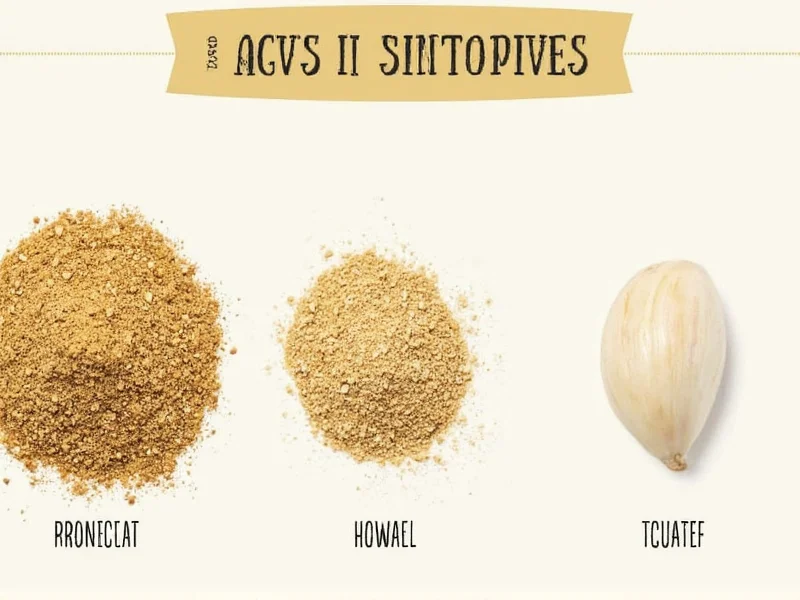Many home cooks confuse “cloves” in recipes—sometimes referring to individual garlic segments, other times to the spice called “clove.” Understanding this distinction is crucial for successful substitutions in your cooking. Let's clarify both scenarios and provide practical solutions for each situation.
Understanding the Terminology Confusion
When recipes mention “cloves,” they typically refer to individual segments of a garlic bulb. A single garlic bulb contains multiple cloves, usually 10-12 depending on variety. The spice called “clove,” however, comes from the dried flower buds of the Syzygium aromaticum tree and has a completely different flavor profile—warm, sweet, and spicy with notes of cinnamon and citrus.
Substituting Garlic Powder for Fresh Garlic Cloves
This is the most common substitution scenario. When a recipe calls for “3 cloves of garlic” and you only have garlic powder, you can make an effective substitution with proper measurement.
| Fresh Garlic | Garlic Powder Equivalent | Best For |
|---|---|---|
| 1 small clove | 1/8 teaspoon | Sauces, dressings, marinades |
| 1 medium clove | 3/16 teaspoon | Roasts, stews, soups |
| 1 large clove | 1/4 teaspoon | Strong-flavored dishes, braises |
When making this substitution, remember that garlic powder provides consistent flavor but lacks the fresh, pungent bite of raw garlic. For best results in garlic powder substitute for fresh cloves in recipes, add the powder early in the cooking process to allow flavors to meld properly.
What If You Need Clove Spice Instead?
If your recipe actually requires the spice “clove” (not garlic cloves), garlic powder won't work as a substitute. Cloves have a distinctive warm, sweet-spicy flavor that’s essential in certain dishes like pumpkin pie, mulled wine, and Indian curries.
For garlic powder substitute for clove spice alternatives, consider these options:
- Allspice (use 3/4 amount) – closest flavor match with similar warm notes
- Nutmeg (use 1/2 amount) – provides warmth but milder flavor
- Cinnamon (use 1/2 amount) – good for sweet applications only
- Pumpkin pie spice (use equal amount) – blend that includes clove notes
Practical Tips for Successful Substitutions
When implementing your garlic powder substitute for fresh garlic cloves conversion, keep these professional cooking tips in mind:
- Always start with less garlic powder than you think you need—you can add more but can't remove it
- For garlic powder substitute ratio for cloves in raw applications (like salad dressings), reduce the amount by 25% as raw garlic powder can be harsh
- When substituting in garlic powder substitute for roasted garlic cloves, increase the amount by 20% since roasting mellows fresh garlic
- For garlic powder substitute for minced garlic in sauces, add 1/2 teaspoon water per 1/8 teaspoon powder to reconstitute
When Substitutions Won't Work
Some recipes rely specifically on the texture or visual presentation of fresh garlic cloves. For garlic powder substitute limitations in traditional recipes, avoid substitutions in these situations:
- Whole roasted garlic heads where cloves are squeezed from their skins
- Recipes featuring garlic confit where whole cloves are preserved in oil
- Dishes where garlic is used as a flavor-infused oil by frying whole cloves
- Recipes specifically calling for the spice “clove” in pickling or baking
Creating Your Own Garlic Powder
If you frequently need garlic powder substitute for fresh cloves measurements but prefer homemade ingredients, making your own garlic powder is simple:
- Peel and thinly slice 10-12 fresh garlic cloves
- Dehydrate at 140°F (60°C) for 6-8 hours until completely brittle
- Grind to fine powder in a spice grinder
- Store in an airtight container away from light
Homemade garlic powder provides superior flavor compared to store-bought versions and gives you complete control over the garlic powder substitute for fresh garlic ratio in your cooking.











 浙公网安备
33010002000092号
浙公网安备
33010002000092号 浙B2-20120091-4
浙B2-20120091-4